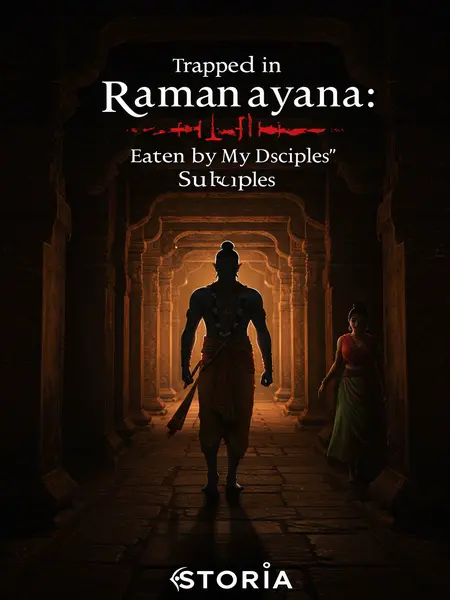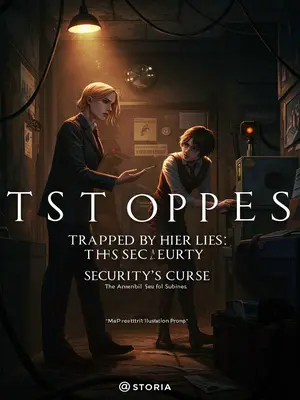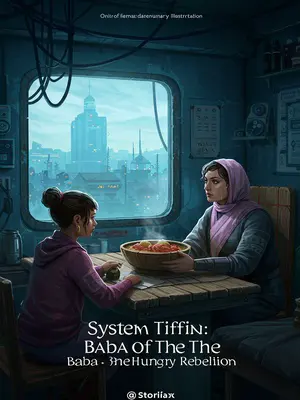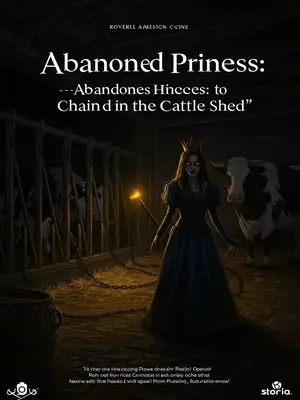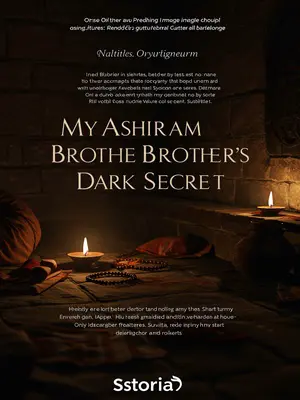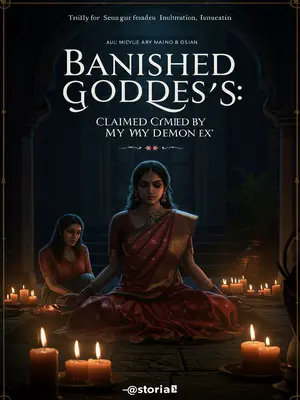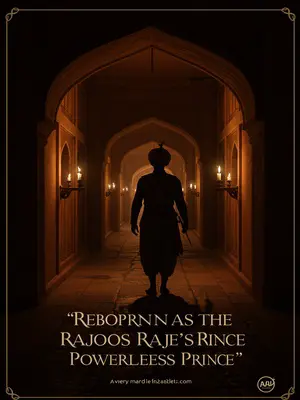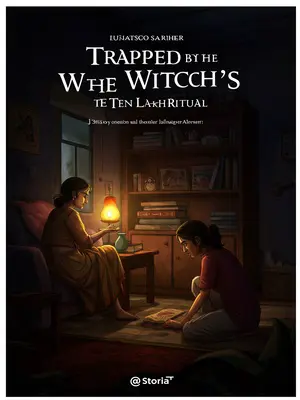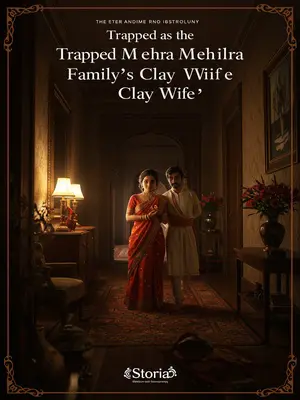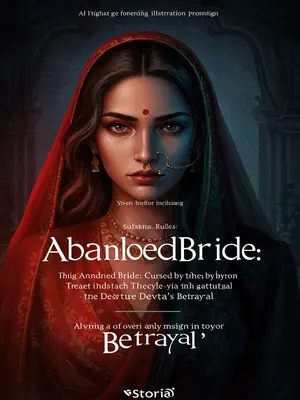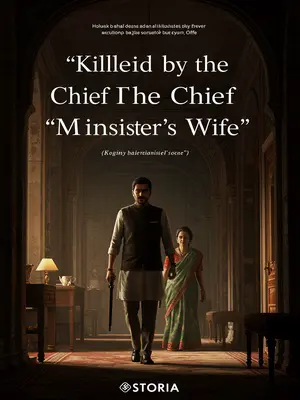Chapter 2: Offerings on the Road
I ride the white mare, watching Bhondu lead it onward.
The old wooden saddle creaks, digging into my thighs with every step. Sunlight beats down, sweat trickling beneath the saffron angavastram. The mare’s tail flicks at flies—drawn by the lingering stench of blood. My grip on the reins is tight, my knuckles pale beneath streaks of gore.
Compared to the others, Bhondu seems the most normal right now.
He trudges along, swinging a dusty bag, his piggy snout twitching as he hums a bhajan—off-key. Of the three, he seems least likely to eat me. I watch him, looking for cracks in his mask.
If it’s only gluttony, there’s food in the tiffin on the horse, and we can always ask for prasad at the next temple.
My gaze falls on the steel tiffin tied to the saddle—a familiar, battered box with a Ganesh sticker. I remember the taste of cold aloo sabzi, the smell of rotis wrapped in newspaper. Maybe hunger is all that drives Bhondu. Maybe there’s hope.
I decide to start with him for information.
My teacher instincts kick in. Like a schoolmaster prodding a student, I plan my questions carefully. I clear my throat, trying to sound casual.
"Bhondu, what have you all been eating?"
I try for the tone of an aunt discussing shaadi food—light, curious, not accusatory. My words float above the clop of hooves and distant cawing. Inside, dread churns my gut.
A flicker of nervousness crosses Bhondu’s face before he laughs. "Guruji, don’t misunderstand—these are offering infants sent by the Queen’s Kingdom."
The laugh is forced, almost a squeal. His eyes dart, looking for someone to contradict him. He opens his mouth wide, showing yellowed teeth and bits of flesh. My skin crawls.
"Offering infants?" I echo, voice cracking.
The words slip out before I can stop them. I glance at the others, but Elder Bhaiya and Shambhu are stone-faced.
Bhondu pulls a sack from the horse’s back and dumps it. Corpses of infants, each the size of a fist, tumble onto the dusty road.
The sack lands with a dull thud. My heart jumps as tiny, twisted bodies spill out, faces frozen in silent screams. Dust rises, settling on their forms. I slap a fly from my cheek, fighting to keep my lunch down. A memory flashes—me as a child, shielding a shivering puppy from older boys’ kicks. That urge to protect, now mocked by this horror.
I clamp my mouth shut, but my stomach heaves, and the taste of last night’s oily vada pav floods my mouth. I double over, retching in the dirt. Bhondu snickers. A temple bell clangs in the distance, joined by the faint drone of a priest’s voice on a loudspeaker, as if nothing is wrong.
"How can this be allowed?" My voice is a tremor, barely a whisper.
The world blurs at the edges. I force myself to look, to listen, to survive.
Bhondu stacks the tiny bodies like sweets in a mithai box. "Guruji, this is nothing. At Amarnath Mountain’s Dhanvantri Ashram, there’s a sanjeevani tree—needs infants picked from thousands of miles away, pickled for three thousand years, sacrificed for three thousand years, refined another three thousand. Just a sniff gives a hundred years’ life."
His tone is as casual as describing a family pickle recipe. His eyes glaze, lost in the ritual. My insides twist at the casual cruelty.
Shambhu laughs, oily and sly. "Don’t know if we’ll have Guruji’s blessing to taste one at the ashram."
He looks at me sideways, like the uncle at weddings with a nasty joke. I keep my jaw clenched, remembering the rule—no talking to Shambhu.
At that moment, the mare lowers its head and crunches a skull between its teeth.
The sound is sharp and sickening. I jerk the reins, but the mare keeps chewing, crimson flecks on her lips. A splatter of bone lands on my shoe. My vision swims.
"Arrey yaar." I can’t hold back—I vomit onto the ground. The world spins, my throat burns, eyes water. Somewhere, the bells keep ringing.
【Be careful of the fifth person in the group.】
This rule echoes in my mind, louder than the railway loudspeaker at Dadar.
By order of joining, Shambhu was last to join.
The thought is stubborn, like a sticker on a new auto. Shambhu, always on the fringes. Was that on purpose?
The rule forbidding communication with him is another warning.
A cold shiver runs down my back. In our families, silence is sometimes the sharpest warning—like when elders don’t say certain names after sunset.
Or, by status, perhaps the white mare is the fifth person.
My eyes flicker to the horse, its jaws working methodically. Stranger things happen in Indian myth.
Or maybe, like the Four Corners Game from hostel days, there’s an invisible person behind us—always at your back, never seen.
I remember those late-night tales—always one odd one out, like guessing who’ll start the antakshari on a family road trip.
Some versions of the epic say the real Hanuman was killed here, and the fake one joined the group.
Stories swirl in my mind. Real replaced by fake, truth buried. Is this one of those moments?
I look at Elder Bhaiya. Could he be the fifth?
He meets my gaze, ancient and unreadable. My heart beats faster. I murmur a mantra, seeking comfort.
My head throbs again, the pain in rhythm with the horse’s steps.
I shut my eyes for a second, desperate for peace.
Looking at these three and a horse—none of them seem normal.
I sigh, missing my colony where the worst was a limping stray dog.
"Guruji, we’re almost there." The monkey, scouting ahead, turns back.
His voice is bright, like a kid announcing a mela has started. I snap to attention, searching for any sign of safety.
"Almost where?" I ask, trying to sound light but wary. In my head, the Fiery Mountain looms.
The monkey’s face glows with excitement. "To the Western Heaven!"
His words ring out, the sun pausing overhead. The others perk up, eyes shining. Only I feel dread—knowing Heaven, in these stories, is rarely what it seems.
